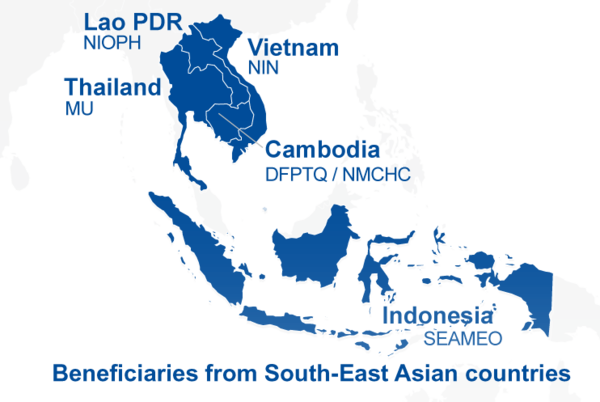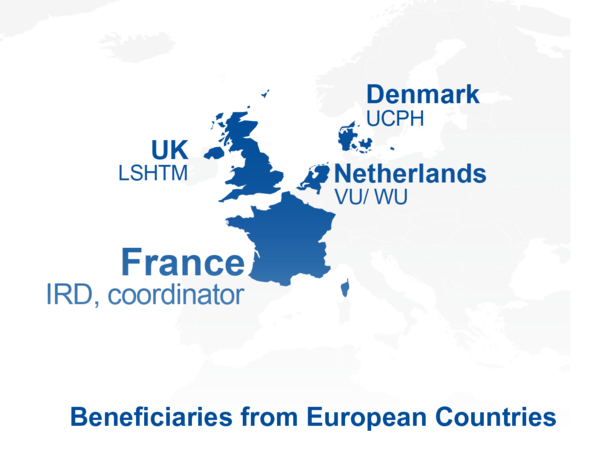This project is coordinated by IRD, Institut de Recherche pour le Developpement
NUTRIPASS "Prevention of malnutrition and associated pathologies" department
UMR Nutripass
BP 64501
911, avenue Agropolis
34394 Montpellier Cedex
FRANCE
Jacques BERGER , Coordinator
Gentiane BLANCHARD , Manager
Tel : + 33 (0)4 67 41 63 67
Fax: + 33 (0)4 67 41 61 57
Partners
An International Consortium consisted of eleven research and ministerial organizations from South-East Asia and Europe.
The consortium was build with the concern to develop a relevant road map to improve micronutrient status of women in reproductive age and young children on a large scale. Consequently, the consortium consists of five countries from South-East Asia representing very different socio-economical, cultural, nutritional and political situations.
The SMILING project involves six Asian and five European Partners. The strengths of the Consortium are the closeness to policy makers (Ministries of Health) in the target Asian countries making success of the Action much more likely; the breadth of expertise and the multi-disciplinary approach allowing a wide approach to the complex field of micronutrient deficiencies and focusing on 5 countries in different stages of development, allowing a South-South learning cycle and cooperation.
Partners have been selected on the basis of particular areas of expertise or qualities that complement one another. These are:
- Academic excellence;
- Interest, experience and expertise with setting and supporting research studies and public nutrition interventions in SEA;
- Links with networks of researchers and other agencies active in nutrition in SE Asia;
- Expertise in a range of subject areas related to nutrition from a public health, food and nutritional security and other perspectives;
- Knowledge about programming challenges on the ground;
- Capacity to link research, policy and action, and
- Experience in linking with consumer groups, professional associations etc.;
- Direct connection for each SE Asian partners with the Ministry of Health and governmental structures;
- Strong experience of partnership and cooperation for each European partner with South and South-east Asian countries.
Six South-East Asian ministries, national agencies and universities:
Map of the partner organizations and countries in South-East Asia, target region of the project
- Ministry of Agriculture, Forestry and Fisheries of Cambodia, Department of Fisheries Post-Harvest Technologies and Quality Control ( DFPTQ)
- Ministry of Health of Cambodia, National Maternal and Child Health Center ( NMCHC)
- Mahidol University in Thailand, ( MU)
- Ministry of Health of Vietnam, National Institute of Nutrition ( NIN)
- Ministry of Health of Laos, National Institute of Public Health ( NIOPH)
- The Southeast Asian Ministers of Education Orgnization, Regional Center for Community Nutrition ( SEAMEO-RECFON)
SE Asian partners are all directly connected to the health sector of their countries and had the responsibilities or duty to support their ministry of health and government for all questions related to nutrition. Consequently, they hold the credit and legitimate weight to interrelate with political decisions in the implementation of nutritional actions.
Due to different political, social, cultural and economical development the involved SE Asian countries are facing a diversity of situations on the control of micronutrient deficiencies in women in reproductive age and young children. Prevalence and severity of malnutrition, micronutrient deficiencies and nutrition related chronic diseases differ widely as well as strategies currently implemented. All institutions partners are committed by their government to carry out research and/or to implement actions to improve the nutritional status of their populations.
Five European research centers specialized in nutrition policies in Southern Countries:
Map of the partner organizations in Europe
- University of Copenhagen, Denmark ( UCPH)
- Wageningen University, Netherlands ( WU)
- VU University Amsterdam, Netherlands ( VU)
- London School of Hygiene and Tropical Medicine, UK ( LSHTM)
- IRD, Research Institute for Devlopment, France - Project Coordinator ( IRD)
European partners have all in common the duty and interest to develop research, training and expertise to contribute to the improvement of nutritional status of populations worldwide with a special attention to the most vulnerable groups, women of reproductive age, infants, young and school-age children.
Developing research, training and actions "in the South, with the South and for the South" is also a commitment and a common goal of the European partners involved in this project with complementary skills and expertise in malnutrition, undernutrition as well as overnutrition, nutritional factors to non-nutritional factors influencing nutritional status, infections and nutrition, relationships between nutrition and chronic diseases including the potential link between early malnutrition and risk of chronic diseases in adulthood.
Moreover, some of the European partners of the consortium have developed specific skills concerning new methods such as mathematical modeling to help formulate population-specific food-based interventions, support advocacy efforts and inform nutrition intervention and policy decisions; or expertise to use the Multi-Criteria-Mapping to reach consensus among stakeholders about a set of priority actions to control the widespread micronutrient deficiencies among vulnerable groups in SEA; or been pioneers in carrying research on promising alternative new ways to prevent micronutrient deficiencies in women before and during pregnancy.
Moreover, all European partners have long experience of partnership and collaborative work in developing and emerging countries, especially in Asia.
"SMILING for Action", Final dissemination event, 3rd April, Phnom-Penh, Cambodia
The final dissemination event will be organized Thursday 3rd of April 2014, at Sofitel Phnom-Penh, Cambodia. The five national roadmaps of priority interventions to prevent micronutrient deficiencies during the project will be presented to a large audience of stakeholders, policymakers, representatives of International organizations involved in nutrition policies implementation.
Publication on the project in "Food and Nutrition Bulletin"
The SMILING project was the topic of a publication in Food and Nutrition Bulletin , vol. 34, no. 2 (sup.), "The SMILING project: A North–South–South collaborative action to prevent micronutrient deficiencies in women and young children in Southeast Asia" Berger J. et al
SMILING outcomes at the Micronutrient Forum Conference
Two presentations at the Micronutrient Forum Global Conference (Addis Ababa, Ethiopia, June 2014) will be about specically SMILING. Many researchers from the project will present outcomes related to the project.












